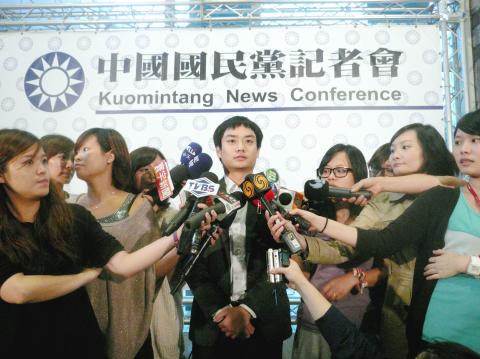The Chinese Nationalist Party (KMT) yesterday announced that it would not appeal the ruling of the Taiwan High Court maintaining an injunction to preserve Legislative Speaker Wang Jin-pyng’s (王金平) KMT membership, amid controversy over a probe into alleged improper lobbying by Wang.
The move is seen as a gesture from President Ma Ying-jeou (馬英九) and the KMT to engineer a reconciliation with Wang, as he would be able to temporarily maintain his membership and position as legislative speaker until a final ruling is handed down.
“President Ma knows that many party members support his stance of opposing improper lobbying and he also heard their concerns about the political situation. He hopes to maintain political stability, while clarifying the [alleged improper lobbying] incident,” KMT spokesman Yin Wei (殷瑋) said.

Photo: CNA
The KMT was entitled to file an appeal against the Taiwan High Court’s decision with the Supreme Court by Friday.
The legal battle between Wang and the KMT began when Wang filed a civil suit at the Taipei District Court on Sept. 11 to request an injunction against the KMT’s revocation of his membership.
The district court ruled on Sept. 13 that Wang could retain his rights as a party member until a final ruling, on the condition that he pays a NT$9.38 million (US$315,000) guarantee. The KMT immediately appealed to the Taiwan High Court and lost the appeal on Tuesday.
Yin said injunctions typically deal with procedural problems and the issue of Wang’s party membership should be resolved via the lawsuit itself. The KMT will wait for the court to hand down a final ruling on whether Wang should maintain his party membership.
“President Ma continued to stress that a legislative speaker’s [alleged] involvement in improper lobbying is a serious matter in any democratic country and it is his responsibility to handle it,” Yin said.
The Ma administration has softened its stance in the past week, while the political rift between Ma and Wang persists.
Premier Jiang Yi-huah (江宜樺) on Friday also took the initiative to talk to Wang about the month-long political impasse, as a friendly gesture.
Ma and Wang are scheduled to meet during the Double Ten National Day celebrations in front of the Presidential Office Building on Thursday.
Commenting on the KMT’s decision, Democratic Progressive Party (DPP) Legislator Kao Jyh-peng (高志鵬) said the move might be a result of its consideration that if it continued to “ruthlessly” proceed with its “Wang elimination plan,” it would negatively affect prosecutors who are looking into allegations that Prosecutor-General Huang Shih-ming (黃世銘) leaked details to Ma of an investigation concerning Wang’s alleged improper lobbying.
DPP caucus whip Ker Chien-ming (柯建銘), who was allegedly involved in the alleged improper lobbying case, said Ma should apologize to the public over the matter, remove Jiang as premier and seek a reconsolidation with opposition parties.
Additional reporting by Rich Chang

The CIA has a message for Chinese government officials worried about their place in Chinese President Xi Jinping’s (習近平) government: Come work with us. The agency released two Mandarin-language videos on social media on Thursday inviting disgruntled officials to contact the CIA. The recruitment videos posted on YouTube and X racked up more than 5 million views combined in their first day. The outreach comes as CIA Director John Ratcliffe has vowed to boost the agency’s use of intelligence from human sources and its focus on China, which has recently targeted US officials with its own espionage operations. The videos are “aimed at

STEADFAST FRIEND: The bills encourage increased Taiwan-US engagement and address China’s distortion of UN Resolution 2758 to isolate Taiwan internationally The Presidential Office yesterday thanked the US House of Representatives for unanimously passing two Taiwan-related bills highlighting its solid support for Taiwan’s democracy and global participation, and for deepening bilateral relations. One of the bills, the Taiwan Assurance Implementation Act, requires the US Department of State to periodically review its guidelines for engagement with Taiwan, and report to the US Congress on the guidelines and plans to lift self-imposed limitations on US-Taiwan engagement. The other bill is the Taiwan International Solidarity Act, which clarifies that UN Resolution 2758 does not address the issue of the representation of Taiwan or its people in

US Indo-Pacific Commander Admiral Samuel Paparo on Friday expressed concern over the rate at which China is diversifying its military exercises, the Financial Times (FT) reported on Saturday. “The rates of change on the depth and breadth of their exercises is the one non-linear effect that I’ve seen in the last year that wakes me up at night or keeps me up at night,” Paparo was quoted by FT as saying while attending the annual Sedona Forum at the McCain Institute in Arizona. Paparo also expressed concern over the speed with which China was expanding its military. While the US

SHIFT: Taiwan’s better-than-expected first-quarter GDP and signs of weakness in the US have driven global capital back to emerging markets, the central bank head said The central bank yesterday blamed market speculation for the steep rise in the local currency, and urged exporters and financial institutions to stay calm and stop panic sell-offs to avoid hurting their own profitability. The nation’s top monetary policymaker said that it would step in, if necessary, to maintain order and stability in the foreign exchange market. The remarks came as the NT dollar yesterday closed up NT$0.919 to NT$30.145 against the US dollar in Taipei trading, after rising as high as NT$29.59 in intraday trading. The local currency has surged 5.85 percent against the greenback over the past two sessions, central